A double bill by The Dutch National Opera with a dark dreaming Zemlinsky and a witty Puccini He would probably not have approved. To separate Gianni Schicchi from its two other parts of Il trittico - a triptych of one act operas - and combine it with a work by another composer. Giacomo Puccini emphatically saw them as an unity; the dark Il Tabarro, the sereen Suor Angelica and the bright, comical Gianni Schicchi. In this production for The Dutch National Opera, the triangular relationship of Il Tabarro, in which a man kills the lover of his wife, is exchanged for Alexander von Zemlinsky's Eine Florentinische Tragödie, in which the same thing happens. ZEMLINKSY During Gustav Mahler's marital crisis – his wife Alma had an affair with architect Walter Gropius (founder of Bauhaus, who would be her second husband after Gustav's death) – Alexander von Zemlinksy chose Mahler's side. Zemlinsky's ambivalent feelings towards Alma Mahler, the woman he once fell in love with, found their way to his Maeterlinck songs and, later, to the opera Eine Florentinische Tragödie. With a keen (and jealous) eye for the success of Richard Strauss's Salome, Zemlinsky made an attempt with Eine Florentinische Tragödie to close the gap between him and the public at large with his own post-romantic psychopathological one act opera based on a text by Oscar Wilde. It didn't quite work out. The story of the Florentine merchant Simone, who killed the lover of his wife Bianca before her eyes, didn't really made into a hit. It was neither a scandal like Salome, the opera that enabled Strauss to buy a beautiful villa in Garmisch, nor a great success. The commotion was limited to Alma Mahler who recognized herself in Bianca and would never forgive Zemlinksy for that. For this triangular relationship, stage designer Raimund Orfeo Voight has designed a constantly rotating and tilting stage. The bare stage gives the audience a view from different angles on the three main characters. It's a ride on turbulent waves - this Florentine drama dressed in the chromaticism of the early twentieth century - on which the thoughts of this Wagnerian drifts towards Der Fliegende Holländer. Not that Der Holländer has any business here but it's a bridge to Jan Philipp Gloger (his Fliegende Holländer-production from 2012 will get its reprise next summer in Bayreuth). After his Rosenkavalier from 2015, Gloger again takes charge of the direction for a production for The Dutch National Opera in a very convincing way. There's no such thing as a free lunch for him, he has always had to work hard to make a living and he is imprisoned in a loveless marriage. His wife hates him and he must, back from a long working day, see to it that she keeps it with another man, a prince for that matter, the son of the Duke of Florence. The initial question in Wilde's unfinished play (does the man known from the beginning of his wife's adultery?) is answered in the affirmative right away. We see the woman, Bianca (Ausrine Stundyte), with the prince Guido Bardi (Nikolai Schukoff), making out - we even fear that they will fall off the stage - while Simone watches that scene in defeat. The initial response from Simone - a role of John Lundgren who, after his terrific Bayreuther Walküre Wotan from last summer, shows that besides the arrogance of a chief god he is also capable of combining both the tormented soul and the violent aspects of a simple man - is that of someone whose heart beats for money rather than for his wife. He, worthy of a true merchant, tries to sell the prince a nice piece of textile. The prince offers him double the price of what Simone asks for and with a vast sum of money in prospect the merchant seems to stay away from any further plans for revenge. But pride wins over greed, honor wins it from material wealth and Simone eventually challenges the prince to a duel (a class struggle depicted by a broken bottle against a sword) in which he finally kills him with bare hands. Making himself ready to get rid of his wife after that, Bianca says full of awe and admiration that she did not know he was so strong. Simone replies with amazement that he only now sees how beautiful she really is. The couple then fall into each other's arms. With the light that breaks through in the music, so aptly supported by the lighting on stage, this scene feels like a dream that might conceal a horrible truth: the merchant who assassinates his wife and himself after he had killed his wife's lover. At the very end we see, when the lights are dimmed again, three bodies lying on stage. The question is whether Gloger meant it this way, but the possibility of seeing the plot twist in Wilde's text as a dream does provide the ending, for those who need it, with some more credibility. GIANNI SCHICCHI In sharp contrast with the dark dream of Eine Florentinische Tragödie stands the comedy of the cheerful scammer Gianni Schicchi. Just like in his Rosenkavalier, Jan Philipp Gloger once again shows himself as a director with a superb sense of humour and timing (the first does not go without the last of course) and, as with Strauss, he braids action and music seamlessly together (the joke with the mobile phone is quite brilliant). With his direction he underscores the ingenuity of the composer, Puccini, and turns Gianni Schicchi into a convincing piece of music theatre on all fronts, in which it is once again demonstrated that good singing cannot do without good acting. Buoso Donati is dead and the members of his family act like they are mourning. In reality they couldn't have cared less if the old man had been a total stranger. But the man leaves a legacy and that turns the family into devotional mourners. If it turns out that Buoso left his complete assets to the church, the sadness that was played turns into real grief and the party starts to panic. Gianni Schicchi is called to the rescue, a chat maker and mister know-it-all who is not held in high esteem by the Donati family. But necessity (read: greed) knows no law or tenets. Just like in Eine Florentinische Tragödie, Gianni Schicchi refers to foreigners who are viewed with wary eyes. In Zemlinksy's piece it are the English who ruin the market with their low prices, with Puccini it is the title hero who, as a newcomer in Florence, is viewed with suspicion. His role as outsider gets an accent in his clothing. Dressed in a Metallica t-shirt, Gianni Schicchi (Massimo Cavalletti) fools everyone. Like a Master of Puppets, Schicchi pulls the strings of those who think they can use (abuse) him for their own benefit. Gianni awards himself with the main prize from Buoso's inheritance and allows his daughter Lauretta (Mariangela Sicilia, the embodiement of youth) to marry her beloved Rinuccio (Alessandro Scotto di Luzio). All well when it ends well. The room in which everything takes place is then tilted. It is, in addition to the two quotes of Bianca hanging on the wall – in Italian translation - one of the few scenic points of reference with Eine Florentinische Tragödie. Draped in yellow light, Simone and Bianca declare their love to each other and in yellow light Lauretta sings Puccini's hit-aria O mio babbino caro ("Oh my dear father"), in which she succesfully asks her father Gianni Schicchi for help so that she eventually can marry Rinuccio. The yellow light as a visual leitmotif, a love motif, recurring in both operas that at the very end - when the walls of Buoso Donati's house are pulled up - are visual linked together. We see Simone and Bianca sitting on stage (so much for my dream interpretation in which they both were dead) and Buoso and Bardi lying dead side by side. Zemlinksy's dark dream and Puccini's comedy find each other in one final visual connection. CODA Satisfied, the bitter-sweet combination of Zemlinksy and Puccini tasted good, I ask Nikolai Schukoff for a signature and with his greetings for my mom (she found his Lohengrin from three years ago very beautiful) I go home. Eine Florentinische Tragödie:
Guido Bardi: Nikolai Schukoff Simone: John Lundgren Bianca: Ausrine Stundyte Gianni Schicchi: Gianni Schicchi: Massimo Cavalletti Lauretta: Mariangela Sicilia Zita: Enkelejda Shkosa Rinuccio: Alessandro Scotto di Luzio Conductor: Marc Albrecht Netherlands Philharmonic Orchestra The Dutch National Opera 11 November 2017 - 28 November 2017
0 Comments
Leave a Reply. |
TIMELINE
July 2024
|

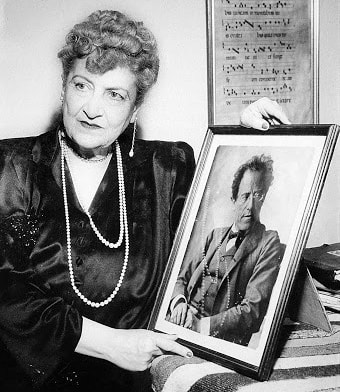
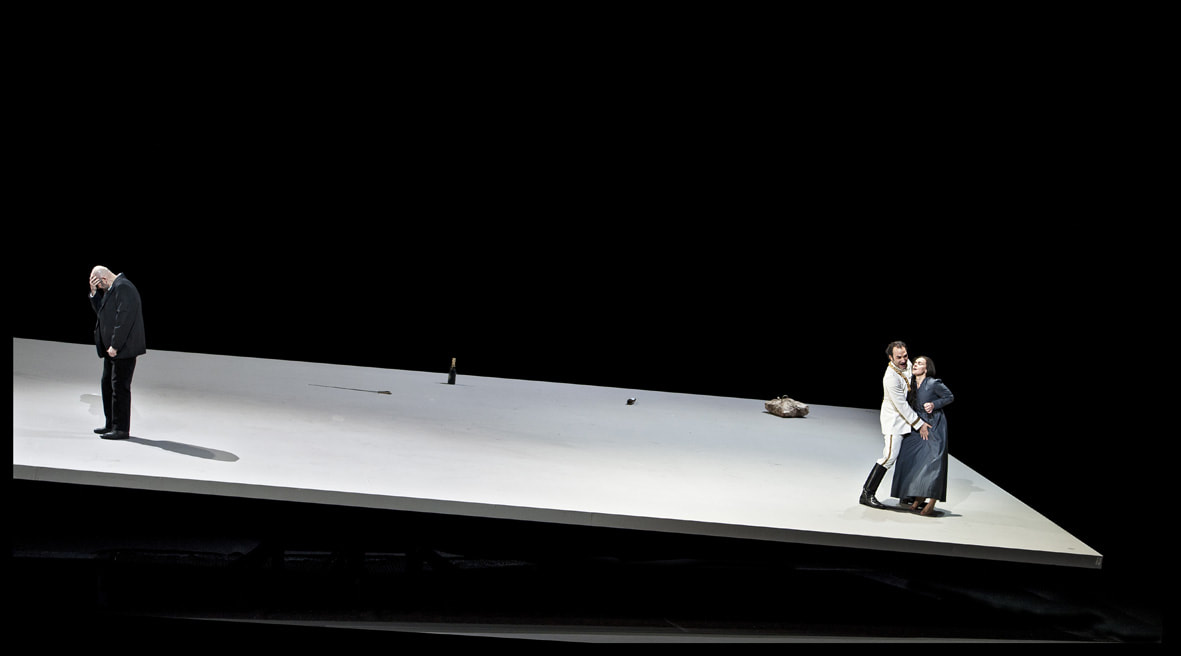
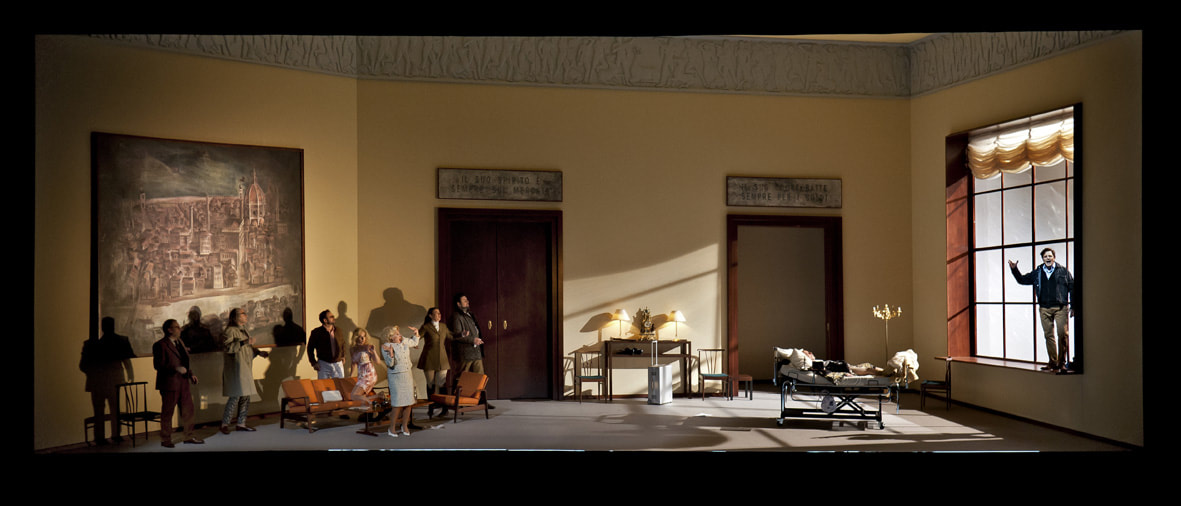
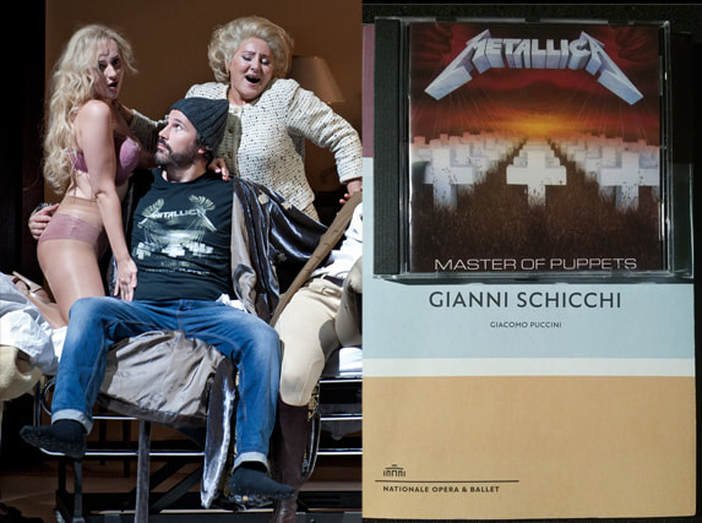

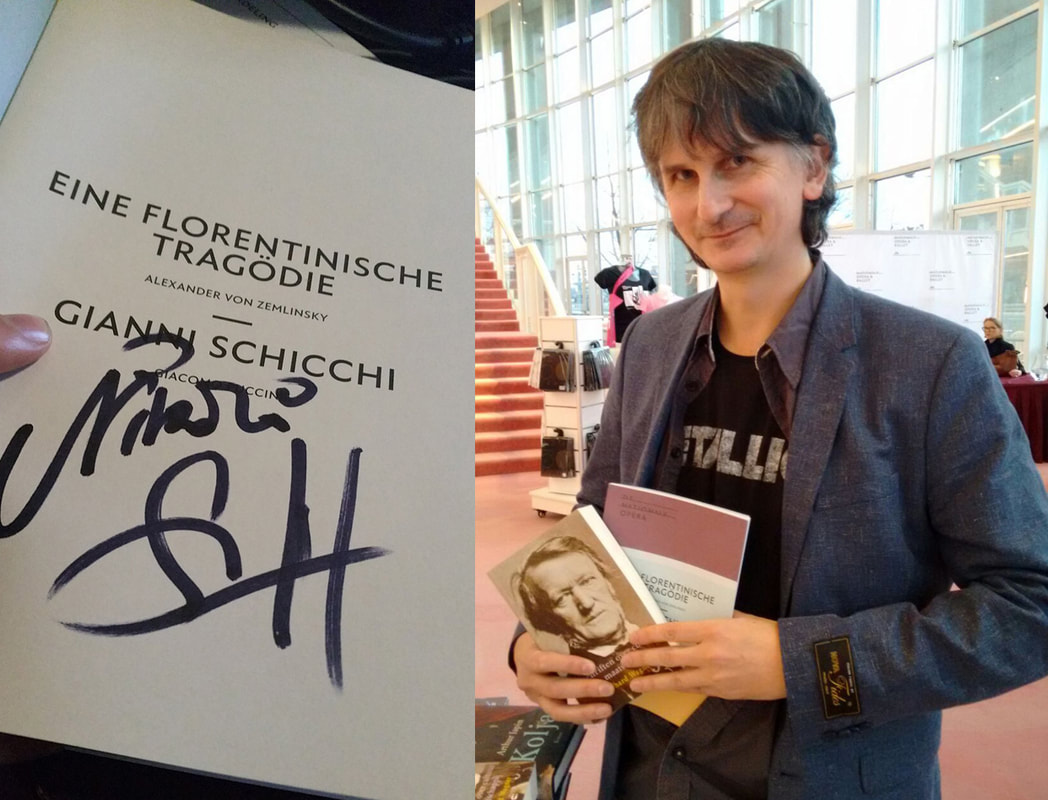

 RSS Feed
RSS Feed